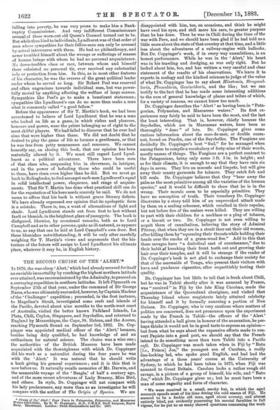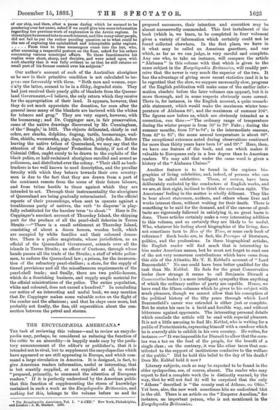THE SECOND CRUISE OF THE ALERT:*
IN 1878, the war-sloop 'Alert,' which had already secured for itself an enviable immortality by reaching the highest northern latitude ever attained, was recommissioned by the Admiralty, to proceed on a surveying expedition in southern latitudes. It left Plymouth on September 25th of that year, under the command of Sir George Nares, who was ultimately succeeded, however, by Captain Maclear of the Challenger ' expedition ; proceeded, in the first instance, to Magellan's Strait, investigated some reefs and islands of the Pacific, devoted about nine months to the north-west coast of Australia, visited the better known Falkland Islands, La Plata, Chili, Ceylon, Singapore, and Seychelles, and returned to England by Mozambique, the Cape, St. Helena, and the Azores, reaching Plymouth Sound on September 3rd, 1882. Dr. Cop- pinger was appointed medical officer of the Alert,' because, besides being duly qualified, he had knowledge of and an enthusiasm for natural science. The choice was a. wise one ; the authorities of the British Museum have been made acquainted with the thoroughness with which Dr. Coppinger did his work as a naturalist during the four years he was with the Alert.' It was natural that he should write a book giving his general experiences ; and it is this that is now before us. It naturally recalls memories of Mr. Darwin, and the memorable voyage of the Beagle,' of half a century ago, and of the more recent adventures of Lady Brassey, Miss Bird, and others. In style, Dr. Coppinger will not compare with his lady predecessors, any more than as an investigator he will compare with the author of The Origin of Species. We are • Cruise of the' Alert :' Pour Years in Patagonian, Polynesian, and Mascarene Waters (11378-18E). By It. W. Coppinger, M.D.. 0.M.Z.B. Staff Surgeon, Royal Man. Dltustratod. London : Swan Sonnensehein and 0o. 1883.
disappointed with him, too, on occasions, and think he might have used his eyes, and still more his ears, to greater purpose than he has done. Thus he was in Chili daring the time of the war with Peru, and we should have been glad if he had told us a little more about the state of that country at that time, and a little less about the adventures of a railway-engine with bullocks.
But Dr. Coppinger's work, if in every way unambitious, is an honest performance. While he was in the Alert,' his heart
was in his trawling and dredging, as was only right. But he looked about him, too, and has written a very careful and clear statement of the results of his observations. We leave it to experts in zoology and the kindred sciences to judge of the value of what Dr. Coppinger has to say about Hiastemis, Strupocel- laria, Plumularia, Goniocidaris, and the like; but we can testify to the fact that he has made some interesting additions to the sum of general knowledge of places and tribes of which, for a variety of reasons, we cannot know too much.
Dr. Coppinger describes the Alert' as having been in "Pata- gonian, Polynesian, and Mascarene waters." Its first ex- periences may fairly be said to have been the most, and the last the least interesting. That is, however, chiefly because the Seychelles, which are in Mascarene waters, have been so thoroughly " done " of late. Dr. Coppinger gives some curious information about the coco•de-mer, or double cocoa- nut, found on Praslin, one of the Seychelles. The Faegians are decidedly Dr. Coppinger's best "find," for he managed when among them to compile a vocabulary of forty-nine of their words, mostly names of things. The Fnegians are a perfect contrast to the Patagonians, being only some 5 ft. 3 in. in height ; and as for their climate, it is enough to say that they have rain six days in seven. They live on mussels and limpets, but will give away their scanty garments for tobacco. They catch fish and kill seals. Dr. Coppinger believes that they "bear away the palm as the most primitive among all the varieties of the human species," and it would be difficult to show that he is in the wrong. Their morals seem to be especially primitive. They have no conception of troth. Their treachery Dr. Coppinger illustrates by a story told him of an unprovoked attack made by them on a sealing schooner, which resulted in their repulse, but not before five of the sealers were killed. They are willing to part with their children for a necklace or a plug of tobacco, or a biscuit or two. Dr. Coppinger is not even willing to acquit them of cannibalism, believing the story of Admiral Fitzroy, that when they are in a strait they eat their old women, after killing them by " squeezing their throats while holding their heads over the smoke of a green-wood fire." Add to this that these savages have "a diabolical cast of countenance," due to
their habit a knocking their front teeth out and growing their hair over their temples, and it will be strange if the reader of Dr. Coppinger's book is not glad to exchange their society for that of the mermaids of Tonga, who present their visitors with kava and pandanus cigarettes, after coquettishly testing their quality.
Dr. Coppinger has but little to tell that is fresh about Chili, but he was in Tahiti shortly after it was annexed by France, was " received" in Fiji by the late King Cacobau, made the acquaintance of the Queensland aborigines, and visited that Thursday Island whose magistrate lately attained celebrity for himself and it by formally annexing a portion of New Guinea. Dr. Coppinger, who is very cautions where matters of politics are concerned, does not pronounce upon the experiment made by the French in Tahiti—the officers of the Alert' having attended a ball given in honour of the annexation, he per- haps thinks it.would not be in good taste to express an opinion— bat from what he says about the expensive efforts made to con- vert Papiete into a good port, we should say that the French intend to do something more than turn Tahiti into a Pacific café. Dr. Coppinger was much taken when in Fiji by "Rata [i.e., Prince] Joe," the youngest son of Cacobau, a really fine-looking lad, who spoke good English, and had had the advantage of a three years' course at the University of • Sydney, to which he had been taken in 1875, when Fiji was annexed to Great Britain. Cacobau looks a rather rough old savage, in a picture of a group of himself, his wife, and " Rata Joe," which Dr. Coppinger gives us ; but he mast have been a man of some sagacity and force of character.
" We were received in a small, smoky hut, in which the aged monarch spends most of his time during the cold season of Fiji. He seemed to be a feeble old man, aged about seventy, and almost entirely blind, yet evidently possessing his mental faculties in fall vigour, for he put to us many shrewd questions concerning the work of our ship, and then, after a pause daring which he seemed to be pondering over her name, asked if we could give him some information regarding her previous work of exploration in the Arctic regions. In this subject he seemed take to much interest, and like many other people, did not fail to put the rather puzzling question as to what could be the use of exploring the uninhabited and inhospitable polar regions.
From time to time messengers came into the hut, who, after assuming a respectful posture on the floor, asked for his orders concerning various municipal affairs. To these functionaries his replies were short, sharp, and decisive, and were acted upon with such alacrity that it was fully evident to us that he still retains no small part of his former control over his subjects."
Our anther's account of such of the Australian aborigines as he saw in their primitive condition is not calculated to im- p7cs3 one favourably with them. "Both men and women, espe- &ally the latter, seemed to be in a filthy, degraded state. They had just received their yearly gifts of blankets from the Queens- land Government,—I believe, the only return which they receive for the appropriation of their land. It appears, however, that they do not much appreciate the donation, for soon after the general issue many of the blankets are bartered with the whites for tobacco and grog." They are very expert, however, with the boomerang ; and Dr. Coppinger saw, in fair preservation, some of the native drawings discovered by Mr. Cunningham, of the Beagle,' in 1821. The objects delineated, chiefly in red ochre, are sharks, dolphins, dugong, turtle, boomerangs, wad- dles, shields, woomerahs, pigs, dogs, birds, jelly-fish, &c. Before leaving the native tribes of Queensland, we may say that the attention of the Aborigines' Protection Society, if not of the Colonial Office, ought surely to be drawn to the exploits of the black police, or half-reclaimed aborigines enrolled and armed as policemen, and distributed over the colony. " Their skill as bush- trackers is too well known to need description, and the peculiar ferocity with which they behave towards their own country- men is due to the fact that they are drawn from a part of the continent remote from the scene of their future labours, and from tribes hostile to those against which they are intended to act. Through their instrumentality the aborigines of Queensland are being gradually exterminated. In the official reports of their proceedings, when sent to operate against a troublesome party of natives, the verb to disperse' is play- fully substituted for the harsher term to shoot.' " Here is Dr. Coppinger's succinct account of Thursday Island, the shipping port for the produce of all the pearl-shell fisheries in Torres Straits :—" There is a small settlement at Thursday Island, consisting of about a dozen houses, wooden built, which are occupied by white families and their coloured domes- tics. - There is a police magistrate, whose jurisdiction, as an official of the Queensland Government, extends over all the islands in Torres Straits ; an officer of Customs, through whose hands passes all the trade of the Straits ; a staff of white police- men, to enforce the Queensland law; a prison, for the incarcera- tion of the refractory pearl-shellers ; a store, for the supply of tinned provisions and all the miscellaneous requirements of the pearl-shell trade; and finally, there are two public-houses, which do a flourishing business, and supply ample material for the official ministrations of the police. The entire population, white and coloured, does not exceed a hundred." In concluding our notice of an interesting and useful book, we may mention that Dr. Coppinger makes some valuable notes on the flight of the condor and the albatross ; and that he slays once more, but probably not finally, the fine, old superstition about the con- nection between the petrel and storms.











































 Previous page
Previous page